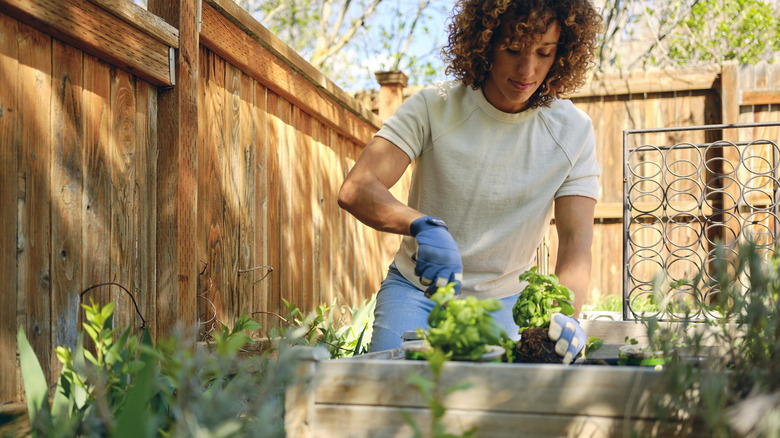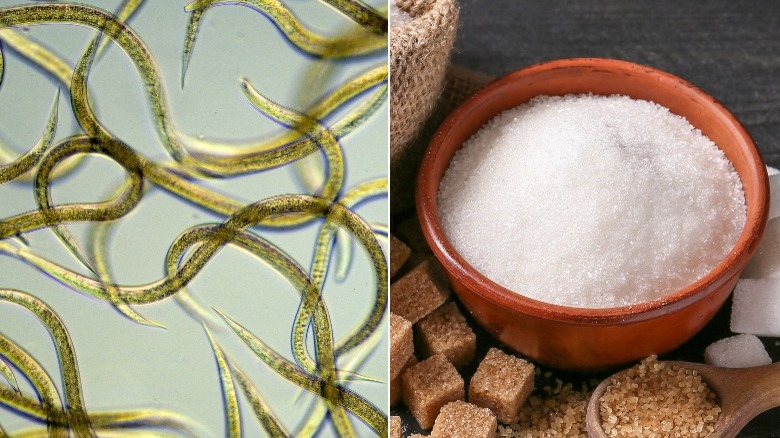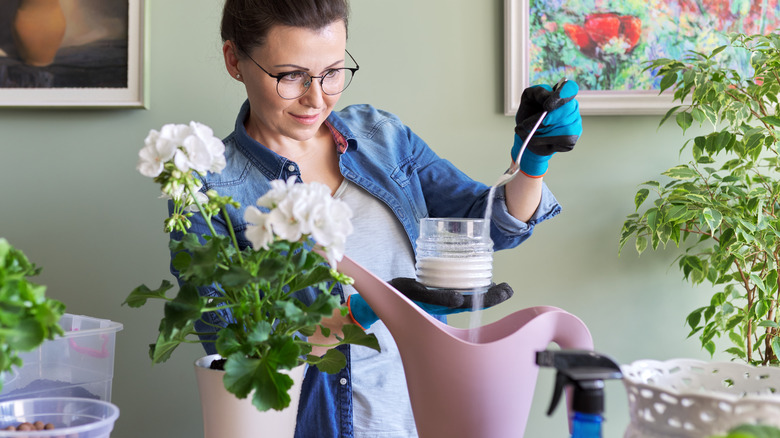The Clever Sugar Hack That Keeps Garden Worms Away From Your Plants
You don't have to be a penny-pincher to appreciate how everyday items can help save money around your home in the most unexpected ways. Who knew, for example, you could hide pesky wall holes with a bar of soap or clean a toilet with hydrogen peroxide? But that's just the start. If you want to reduce the amount of cash you're spending to maintain your lawn and garden, look inside your kitchen pantry. That's where you'll find a sweet hack to keep worms away from your plants: plain sugar. The cheap condiment can kill nematodes before they completely destroy your favorite flowers.
Chances are you've never actually seen nematodes actively damaging your plants in real time. Most of these roundworms are small enough to fit on a pencil tip and live below the soil's surface. Even more confounding about these pale-colored parasites is that their calling cards mimic that of drought damage, such as stunting and yellow and withered leaves. Another symptom is bumpy roots. Root-knot nematodes burrow into a plant's root tissue, making it their permanent food source. Nematode infestation occurs when your plants become the hungry worms' new home; the place they live, eat, and reproduce. Fortunately, common table sugar can evict harmful nematodes from your garden and prevent future attacks.
How to use sugar as a pesticide
Adding sugar to soil overrun with garden worms is like letting kids loose in a candy store. Only worms have less self-control than children and will eventually eat themselves to death. In the end, life is short and sweet for nematodes gorging on plants treated with sugar as the excess glucose reduces their lifespan by causing malnutrition and weakening their immune system. Leveraging the fact that worms are magnetically attracted to sugar and will mindlessly binge on it until their bodies give out is a cost-effective and eco-friendly way to keep nematodes away from plants.
You can use sugar as a pesticide hack in a variety of ways. One of the simplest methods is to sprinkle granulated sugar directly on plants and soil using your fingers. If you are worried about even distribution, add sugar to salt, pepper, or cinnamon shakers and dispense the granules near the base of the plant. Another technique requires mixing 2 cups of water with a half-cup of regular sugar. Simply bring the mixture to a boil while continuously stirring until the granules have completely dissolved. Next, dilute the liquid with 1 gallon of fresh water and spray on and around affected plants, making sure to completely saturate the leaves and soil.
If you don't have granulated sugar on hand, substitute it with molasses. Dissolve 3 tablespoons of the liquid sucrose in 4 cups of warm water, add to a spray bottle, shake well, and spritz on plants and soil.
What to know before applying sugar to plants
Using sugar as a natural insecticide is an ideal hack for humans, pets, and the planet. However, before you switch from poison to pure sugar, it's a good idea to consider the potential disadvantages of doing so. For starters, moderation is key if you don't want to cause root burn and soil damage. Adding too much sugar to soil can lead to fermentation, which draws excess oxygen away from the earth, thereby robbing the plant of an essential ingredient to survive. If you're using the pantry staple by itself to kill nematodes, but don't want to compromise the health of your soil, apply it in small doses over a longer period of time rather than dousing the plant and soil with a large amount of sugar all at once.
Likewise, if you're applying a sugar-water mixture to your plants to deter garden worms, consider doing so in small batches if you're concerned about negative impacts on soil life. Sugar water will kill nematodes, but in the process, it can also hinder plants from absorbing water properly, causing root and leaf damage, and possibly death. This is because plants aren't able to metabolize sugar in the same manner as humans. Surplus sugar triggers a metabolic disorder in plants, blocking roots and inducing rot and wilt. If you notice these symptoms after treating your plants with sugar water, consider uprooting ones that can't be saved, and testing the soil for nematodes prior to reseeding.


